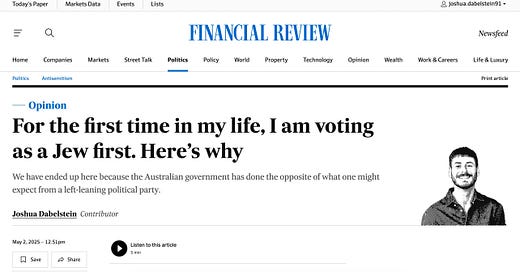Voting against the Greens [pub. AFR election day 2025]
Published by the Australian Financial Review Election Day 2025.
While it would be remiss to present any opinion as the Jewish opinion—I can’t think of a people more constitutionally prone to debate—it is fair to say that the collective temperature of Australia’s Jewish communities is on the warm side ahead of today’s election.
Having experienced a protracted and palpable period of antisemitism in which bipartisan condemnation has offered scant reprieve, Jews of all political persuasions are experiencing grave uncertainty.
The ALP’s attempts to alleviate community concerns began with the appointment of Jillian Segal as Australia’s first Special Envoy to Combat Antisemitism, before committing over $78 million to bolster security at Jewish schools and community centres and launching Operation AVALITE. Additional funding for Holocaust education and a ban on Nazi symbols show a clear legislative intent to stand against hate.
Before October 7, Albanese expressed support for the IHRA definition of antisemitism, dismissed the BDS movement, and waved away the use of the word ‘apartheid’ to describe Israel. While proactive measures already taken by the ALP are welcome, there is confusion over Albanese’s failure to re-iterate these positions. Labor’s internal political machinations may make public conviction impossible, Labor forced to appease their own rank and file in a manner demonstrative of a church too broad on matters pertaining to Israel.
Holding the centre between Greens and Coalition rhetoric may to many have demarcated the ALP’s commitment to just getting on with business: acting on antisemitism, keeping quiet on an Israel accused of war crimes, and refusing to capitulate to dog-whistles from all angles.
But it is Albanese’s inability to verbally match Dutton’s unequivocal support that continues to spur on gnawing uncertainty among many Australian Jews. As these issues coalesced into a political football, Albanese’s noticeable lack of rhetorical vigour has put him closer to the sideline than the scrum.
As far as political footballs go, The Australian Jewish football is a small one, making up 0.4% of the population. In a time before Australians considered that Middle Eastern conflicts should determine who we choose to run our schools and hospitals, this was a much more politically safe football.
Surging antisemitism since October 7 has been too often bandied up as political commentary, conceptions of the very existence of the Jewish state being used to silence those experiencing vilification and ostracization. The tertiary education and arts sectors have left Jewish Australians alienated from organisations and communities that, prior to October 7, felt no need to interrogate Jews on their politics before allowing them to contribute. The most egregious examples of this reside in the arts sector, where the deliberate exclusion of ‘Zionists’ by taxpayer-funded individuals and organisations only worsens.
How did we end up in a situation where on-campus organisations, art galleries, and inner-city sharehouses deemed it reasonable to excommunicate members of only one Australian minority on the basis of their conceptions of self-determination?
And what does this mean for Australian Jews today?
We ended up here because the Australian government did the opposite of what one might expect from a left-leaning political party. They trusted in the marketplace of ideas, opting for a laissez-faire approach to a cultural problem that, as it turns out, is a rot that needed treating with serious government intervention and unequivocal leadership.
What this means for Australian Jews at the ballot boxes is an impossible question to answer. I left a shabbat dinner of 5 last Friday with ten new and mutually exclusive opinions. What I can say is that while many Australian Jews will vote to relieve uncertainty, many others will vote on a plethora of issues that speak to the other 99.6% of the country’s immediate concerns — like the housing crisis, nuclear energy, and Medicare. The fact remains that all citizens deserve to feel understood, represented, and that their values are not incompatible with the national interest.
Despite the difficulties in ascertaining any consensus on the best election outcome, there is widespread fear of the worst: a Labor-Greens minority government. The Greens' hostility toward the Jewish state and its inhabitants, coupled with their growing influence in progressive politics, signals a shift that many consider existential. Though Albanese has ruled out such an arrangement, the prospect of heighted Greens influence in parliament remains.
Despite the impossibility of representing the Jewish vote — as there isn’t one—I can speak for mine.
While some Jewish Australians struggled to ascertain the safety of loved ones, Greens Senator Mehreen Faruqi took to social media to victim-blame those slaughtered, raped and kidnapped on October 7, labelling the illumination of Parliament House in their memory a "disgrace". The number of Greens MPs and candidates who have parroted these sentiments is only a fraction as painful as the silence from those who stand to benefit from keeping shtum.
I am not a single-issue voter, but for the first time in my life I am voting as a Jew first.
Joshua Dabelstein is a freelance writer based in Sydney, Australia.





